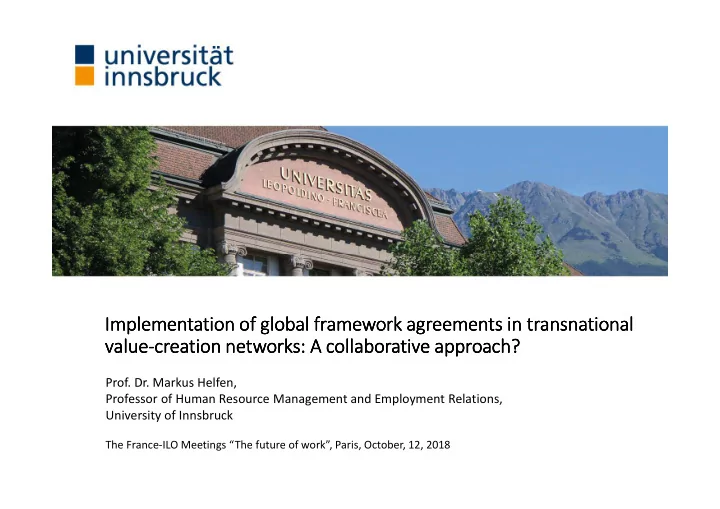

Implementation of global framework agreements in transnational Implementation of global framework agreements in transnational Implementation of global framework agreements in transnational Implementation of global framework agreements in transnational value value value value- -creation networks: A collaborative approach? - - creation networks: A collaborative approach? creation networks: A collaborative approach? creation networks: A collaborative approach? Prof. Dr. Markus Helfen, Professor of Human Resource Management and Employment Relations, University of Innsbruck The France-ILO Meetings “The future of work”, Paris, October, 12, 2018
Advertisements • Helfen, M., Schüßler, E. & Sydow, J. (2018). How can employment relations in global value networks be managed towards social responsibility? Human Relations , doi.org/10.1177/0018726718757060. • Sydow, J., Fichter, M., Helfen, M., Sayım, K.D. & Stevis, D. (2014). Implementation of global framework agreements: Towards a multi-organizational practice perspective. Transfer , 20(4): 489-503. • Helfen, M. & Fichter, M. (2013): Building transnational union networks across global production networks: Conceptualising a new arena of labour–management relations. British Journal of Industrial Relations , 51(3): 553-576. Helfen: Transnational value-creation networks and global framework agreements
Transnational value-creation networks and industrial relations: Background Situation: A progressing network-based reorganization of value creation challenges the enforcement of labor standards. Research question: How can global framework agreements contribute to enforcing labor standards in value creation networks? Thesis: Global framework agreements support the enforcement of labor standards if they create a space for management-union negotiations on implementation. Helfen: Transnational value-creation networks and global framework agreements
Overview 1. Transnational value-creation networks 2. Global framework agreements 3. Challenges and options Helfen: Transnational value-creation networks and global framework agreements
Transnational value creation networks: Illustrative case car manufacturing (…) R1 P1 market S1 relational relational P2 market S2 P3 Lead firm Platform market (OEM) captive S3 P4 market P5 Notation: captive hierarchy Core OEM relational System suppliers 1-n, P6 Knowledge intensive services 1-n Agent (…) market Parts suppliers 1-n Labour intensive services 1-n market P7 OEM Coordinating units, brokers subsidiary 1 Parts/ Raw labour intensive Supplier of raw materials System & knowledge intensive materials services/intermediaries services (Source: Helfen, Schüßler & Sydow, 2018) Helfen: Transnational value-creation networks and global framework agreements
Transnational value creation networks: A transnational arena of employment relations? Economic Institutional forces forces Embedded in multiple institutional structures (e.g. ILO, EU, national) Value Trans- Creation national Networks union Multi-level networks (VCN) relationships (TUN) Third parties Political forces (Source: Helfen & Fichter, 2013) Helfen: Transnational value-creation networks and global framework agreements
Overview 1. Transnational value-creation networks 2. Global framework agreements 3. Challenges and options Helfen: Transnational value-creation networks and global framework agreements
Global framework agreements are… Global framework agreements …agreements between Multi-National Corporation (MNC) and the Global Union Federations (GUF) that • imply a mutual recognition as negotiation partners of both parties, • specify the rules of a regular social dialogue and conflict resolution mechanisms regarding • a set of standards according to ILO conventions, Total number of MNCs with a global framework agreement, 1994-2015 • within a defined organizational domain. But: there is only a relatively small ! number of GFAs (73+), compared to GFAs are an regulatory instrument between ~103,000 MNUs (UNCTAD 2011) or 994 unilateral self-restriction and international EWCs for example (ETUI 2015) law (ILO). Helfen: Transnational value-creation networks and global framework agreements
Global Framework Agreements: FU Berlin research on GFA implemenation, 2008-2011 • Implementation and resources rarely an issue in the negotiations • GFAs in subsidiaries and unions at local sites often unknown • Where GFAs are known, actors lack an understanding of how to use the agreement locally Attempts to use the GFAs often problematic, • because connections to other unions are missing or GFA is used for corporate CSR • But: Single cases and instances of a successful and Core data: 22 multinational firms from innovative implementation of GFAs the European Union in the domain of BWI, UNI and IndustriAll with locations in • global multi-location bodies, Brazil, USA, India & Turkey, • Support in in union organizing and 146 interviews (headquarter and local recognition, level actors: management and labor Resolution of local disputes, • representatives) • Joint implementation initiatives. Helfen: Transnational value-creation networks and global framework agreements
Overview 1. Transnational value-creation networks and labour standards 2. Implementation of global framework agreements 3. Summary Helfen: Transnational value-creation networks and global framework agreements
Summary Value-creation networks provide considerable problems for the functioning of traditional approaches in employment relations Implementation deficits of global framework agreements: 1. Multiplication of negotiation relationships, variety of actors with common, but also diverging goals according to position in the networks, … 2. Institutional distances have often a negative effect: Local regulation, HQ- subsidiary relationships, industry and union cultures,… 3. Organizational reasons: Few changes in business operations, weak monitoring and lack of enforcement,… Not a mere transfer of practices by a single actor, but a negotiated „translation“ (Sahlin-Andersson & Engwall 2002) into multiple contexts for a collaborative implementation Helfen: Transnational value-creation networks and global framework agreements
Helfen: Transnational value-creation networks and global framework agreements
Global framework agreements: Research project FU Berlin, 2008-2011 Region of Sector and global union Production origin federations (GUFs) sites MNCs from the Four countries: 3 GUFs: European Union Brazil, India, (~ 90% of all active Turkey, USA • IndustriAll (IMF + ICEM) global agreements) (according to FDI, • UNI economic development • BWI and system of industrial relations) Core data: 22 multinational firms, 146 interviews (headquarter and local level actors: management and labor representatives) Helfen: Transnational value-creation networks and global framework agreements
Global framework agreements: Implementation practices (Source: Sydow et al., 2014) Helfen: Transnational value-creation networks and global framework agreements
Outlook & trends: New developments in global agreements Rana-Plaza-Agreement (2013) • Implementation: Material and legal resources • Multi-Stakeholder-Agreement (Quelle: bangladeshaccord.org 2017) Siemens Agreement (2012) • Decentralized coordination of local activities • Local implementation agreements (USA, China) (Quelle: siemens.com/press/photo/sosep200618-01d) Asos Agreement (2017) • New type of corporate party: electronic retail platform (2017) Helfen: Transnational value-creation networks and global framework agreements
Recommend
More recommend